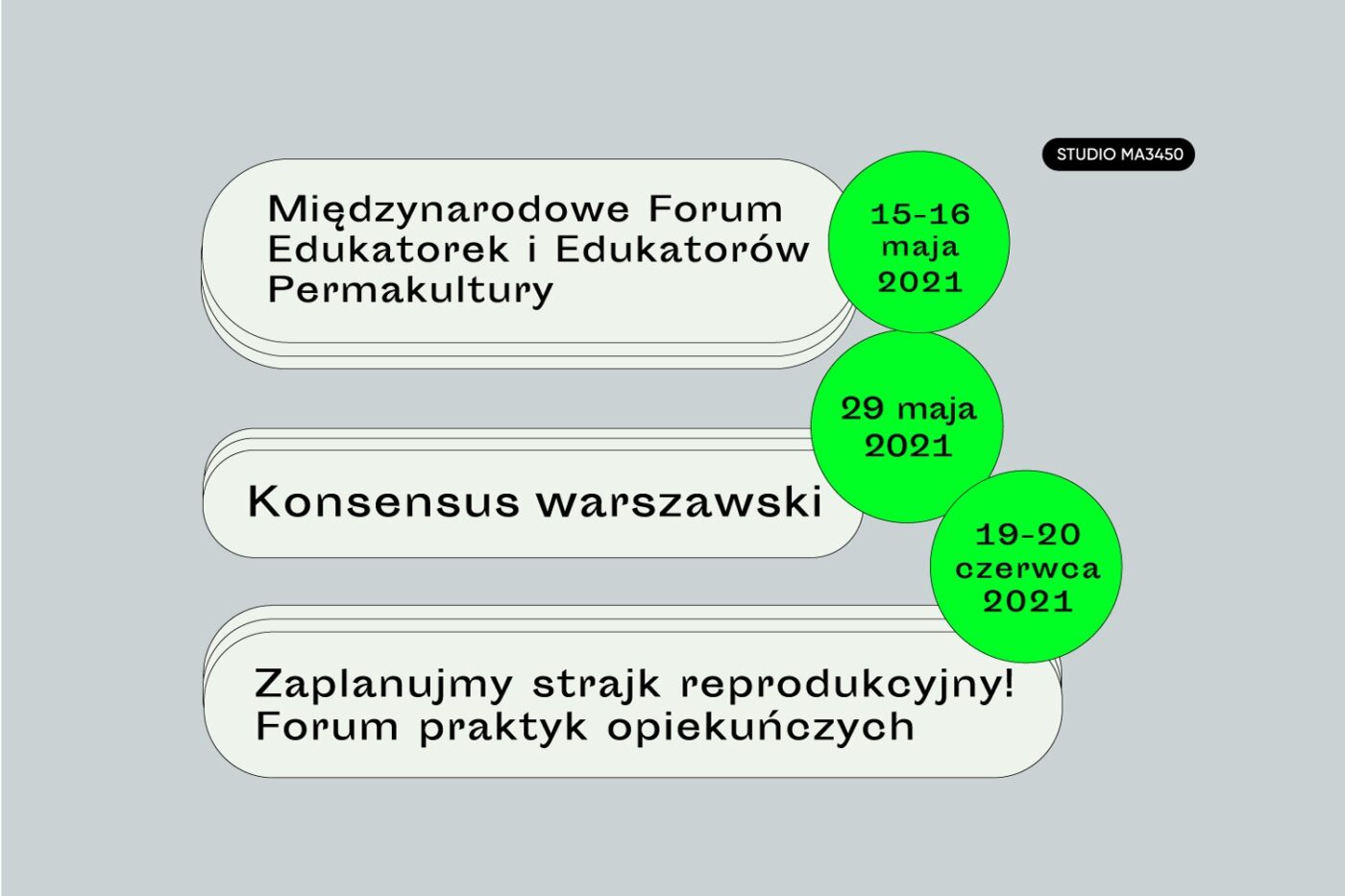Three fora at Biennale
Press release
Three distinctive events: International Forum of Permaculture Educators, Warsaw Consensus and Forum of Care Practices, is what Biennale Warszawa offers the audiences in May and June. This time, the events will be organised in hybrid form, and they will concern changes in food policies, new economic programmes, and care work.
On of the basic formats of Biennale Warszawa activities is a forum. Usually, it would conclude programming series, summarize discussed threads and connect all involved parties. In Biennale’s practice, forums create relationships, build communities and develop collective forms of cooperation. So far, they were organised in our venue, sometimes in city public spaces. For the 1st edition of biennale in 2019, we organised Polish Social Forum, East European – North African – Middle East Forum, Convention of Women Farmers and Trans-unions.
In May and June 2021, another three events will be held. The first one – International Forum of Permaculture Educators (15-16 May) – addressed to activists, representatives of initiatives based in or around Warsaw, such as: community gardens, food cooperatives, family garden allotments, CSAs, countrywomen’s associations, daycares with gardens, educational homesteads, as well as farmers, gardeners working in permaculture, educators in natural building and permaculture pioneers. Permaculture is both the method of designing edible gardens, supporting urban gardening, and the chance for developing food solidarity, supporting local practices, food policies and circular economy. Its fundamental principles are care for the Earth, for people, and for fair division of goods. The second day of the Forum, 16 May, is open for the public. Not only will we look at educational practices, but we will also try to consider how everyone can become a part of a profound transformation which will allow us to enjoy healthy food in cities, as well, and how we can build local communities which will be able to actually implement that change after the pandemic.
The second forum – Warsaw Consensus (29 May) – will be the conclusion of the series “Economics of the future” spanning over a year, and it it will be addressed to economists as well as everyone interested in economic issues, primarily all new ideas which constitute a response to structural crises of capitalism occurring all over the world for several decades. As part of the forum, a document will be drafted – our response to the Washington Consensus. It will include principles on which post-pandemic economics should be based. Publication of a book edited by Przemysław Wielgosz will complete the project.
The third and final meeting – Let’s plan a reproductive strike! Forum of Care Practices (19–20 June) – will conclude the series “Care Revolutions.” In this assembly, we will raise topics like migration and care chains, unequal access to care and reproductive resources, alternative communities and survival strategies in the face of crises, reproduction vs. technological change and climate crisis, and feminized work and social organisation of care. We intend to prepare a manifesto and a list of postulates which could help build a more just world after an effective reproductive strike.
All three forums will be held in hybrid form – we will be broadcasting from our venue on Marszałkowska, but for the first time we will invite the audience to participate also in the web forum, a digital assembly streamed via such platforms as Facebook, Zoom and YouTube. An assembly, a forum, or a convention – all these forms of collective councils, meetings and debates which are so important for Biennale Warszawa and which serve collective development of democratic, systemic alternatives, turn out to be quite difficult, or even entirely impossible to organise in the current situation. Despite pandemic restrictions, we will strive to maintain all three events as spaces for collective work and forming alliances. Because changes we have mentioned can be introduced only as a result of joint effort, through building relationships, bonds and understanding for a different politics. In the pandemic times, with high incidence, deaths of numerous people in Poland and worldwide, the priority is creating alliances for providing care, protecting health and life, suitable appreciation for care work and changes in economic and food policies.
Contact for the media:

